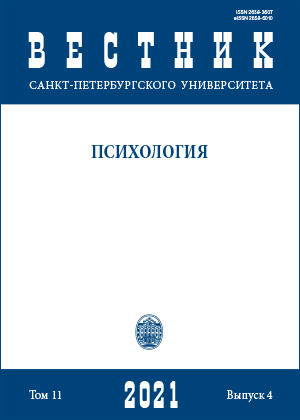Generativity and value orientations during emerging adulthood: Moderating the role of loneliness
DOI:
https://doi.org/10.21638/spbu16.2021.403Abstract
The article discusses the concept of “generativity”, approaches to its study and its place in the framework of foreign and Russian psychology. The period of emerging adulthood is an impor- tant stage in the life cycle of a person, in which personal and professional identity is formed, close relationships, and an individual value system is created. Studies of generativity related to the period of early adulthood have shown that generative orientation is included in the value structure of a person and can be a leading motive. At the same time, this is a period of building social relations and searching for personal boundaries. The article presents the results of an empirical study where 203 emerging adults participated (17–24 years; M=19.58; SD=0.15), of which there were 23 men (11%) and 180 women (89%). In the study, it was hypothesized that in the differential analysis of values, generative orientation and generative actions can be associated with different values. The authors assumed that since loneliness reflects certain aspects of a person’s interaction with society, then at different levels of its severity the specificity of the ratio of values and generativity can also change. The following methods were used: Loyola Generativity Scale (LGS), Generative Actions List (GBC), Differential Loneliness Experience Questionnaire by E.N.Osin and D.A.Leontyev (DOPO) and the “Value Questionnaire” (CO) by Sh. Schwartz. Regression and cluster analyses were applied. The results of the study indicate a close relationship between generativity characteristics and the desire to maintain and preserve traditions (cultural, family, religious, etc.), as well as with a low level of feelings of isolation. It was revealed that generativity is associated mainly with values at the level of personal priorities, rather than at the level of normative ideals. Also, the relationship between generative orientation and hedonism, dependent on the attitude towards loneliness, is discussed. In the desire to avoid loneliness, an inverse relationship was revealed between the characteristics, while in the perception of loneliness as a resource — a direct one. The question is raised about the nature of the manifestation of generativity in people who feel dissatisfaction with interpersonal interaction. The practical significance of the study was that the data obtained confirm that with different severities of loneliness, the characteristics of generativity form different connections with values, which allows a more differentiated approach to accompanying the process of entering adulthood in practical and consulting work.
Keywords:
generativity, generativity orientation, generativity actions, loneliness, isolation, value orientations, hedonism
Downloads
References
References
Downloads
Published
How to Cite
Issue
Section
License
Articles of "Vestnik of Saint Petersburg University. Psychology" are open access distributed under the terms of the License Agreement with Saint Petersburg State University, which permits to the authors unrestricted distribution and self-archiving free of charge.




